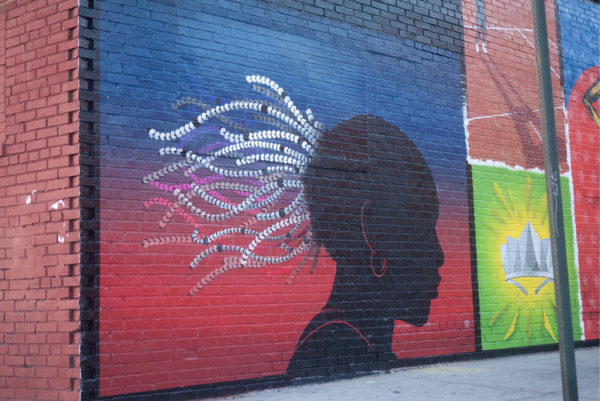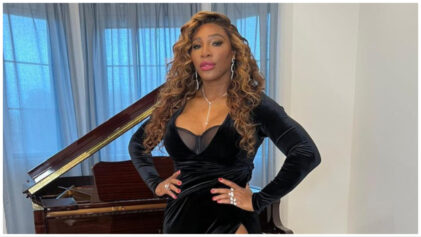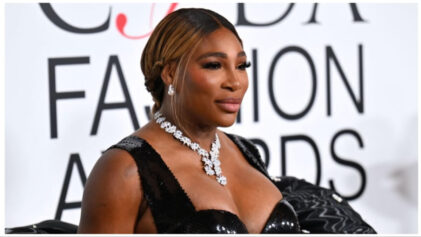With Serena Williams advancing to the second round of the U.S. Open, the greatest tennis player in the world continues her pursuit of the coveted Grand Slam. Williams is poised to become the first woman in 27 years, since Steffi Graff in 1988, to win the Australian Open, the French Open, Wimbledon and the U.S. Open in a single season. There is a great deal of attention on this athlete, with various conversations about her beauty and physique, her compensation compared to other players, and what Williams has had to endure to get this far and receive the credit she deserves.
“Sometimes if I’m down I need to have a little extra fight, a little more power and passion,” she recently said to reporters. “But there’s also a calm that I need to tap into to do the best that I can as well.”
Observers and commentators tend to emphasize Serena Williams’ physical presence, her body and fashion sense. Her beauty and physical features have been critiqued within the context of the white female aesthetic, and one commentator even accused her of using steroids. The attention placed on Williams’ body rather than her mental prowess and acumen is troubling, and shortchanges her abilities. As Patrick A. Wilson argued in the Guardian, “It is Serena’s mental strength that is her biggest weapon, not her body.”
Further, such a conversation reinforces the racial divisions in society, in a country which emphasizes Black physical ability and downplays Black mental capability, and as Wilson notes, fetishizes Black body parts and treats Black people as animal specimens.
Some have made comparisons between Williams and Althea Gibson, the legendary Black tennis champion who is regarded as the Serena of her day. Aggressive like Serena but built like Venus, as the New York Times suggests, Gibson was triumphant in the mid-to-late 1950s, with victories at the French Open, Wimbledon and what would become the U.S. Open. However fantastic her accomplishments, she emerged at a time when a Black woman could not become a figure with greater than life stature. Times have changed, tennis is a big money business, and the United States Tennis Association is headed by a Black woman, Katrina Adams. Adams called Williams “the greatest female athlete of all time, the greatest athlete of all time.”
“Serena Williams is the ultimate champion. She knows what it takes to get to the top,” Adams told Omnisport. “She started at the bottom from Compton, worked her way up through the ranks of the professional tour to No. 1 in the world. She has been No. 1 in the world for the last four years. She’s been No. 1 multiple occasions.”
And yet, over half a century later, a Black woman such as Serena Williams has grappled with scrutiny over her attitude and “angry outbursts” on the court, and, not unlike Jackie Robinson and other trailblazing athletes of earlier generations, has had to pretend as if the criticism does not faze her.
Although she is a higher ranked athlete than Maria Sharapova, she earns $13 million in endorsements to Sharapova’s $23 million. Yet, in the face of apparent racism, Serena appears gracious, as was noted in an interview from the New York Times Magazine:
If they want to market someone who is white and blond, that’s their choice. I have a lot of partners who are very happy to work with me. I can’t sit here and say I should be higher on the list because I have won more. I’m happy for her, because she worked hard, too. There is enough at the table for everyone. We have to be thankful, and we also have to be positive about it so the next black person can be No. 1 on that list.
“I think my tennis speaks for itself,” Williams explained, as reported by NBC Sports. “I don’t need any definition. I don’t need anyone explaining me a certain way or by a certain thing. I go on the court. I work hard. I do the best that I can to be the best that I can be. I go out and I win.”
Serena owes much to her father, Richard Williams who raised her and her sister in Compton, Calif. and cultivated them as “world-beating, transformative figures,” as NBC Sports noted, forever changing the culture of a white-dominated sport.
“He’s been the most important person in my career,” Williams said of her father, who lives in Florida with his new wife and child and is reportedly in ill health. “I do miss my dad obviously. I miss him all the time. I call him. I try to reach out to him a lot. He calls me. He watches my matches. He still tells me things that I’m not doing right,” she added. “Who would have thought that he could have raised two black girls to play a sport that African Americans haven’t typically done well in?” she said of her father earlier this year. “Every time I stand out there, I think that I wouldn’t be here if somebody didn’t have that vision for me. I don’t know if I would have a vision like that for my kids.”
In his autobiography, Richard Williams said he wanted his daughters to grow up in Compton because it would strengthen them.
“It would make them tough, give them a fighter’s mentality,” he wrote. “They’d be used to combat. And how much easier would it be to play in front of thousands of white people if they had already learned to play in front of scores of armed gang members?”
“Daddy believed tennis was our ticket up and out of Compton, the rough-and-tumble neighborhood in Los Angeles where we lived,” Serena wrote. “We had to develop a passion for the game and an iron will to succeed, and all these things would take time presenting themselves.”
Meanwhile, there is a massive mural on display in Brooklyn, New York in honor of the tennis champ. Gatorade commissioned artists from around the world to paint works of art celebrating each of her 21 major victories. In addition to the “Serena 21” art series, Gatorade has released a commercial featuring an interview of the star as a little girl, along with scenes showing her progression into an adult athlete.




